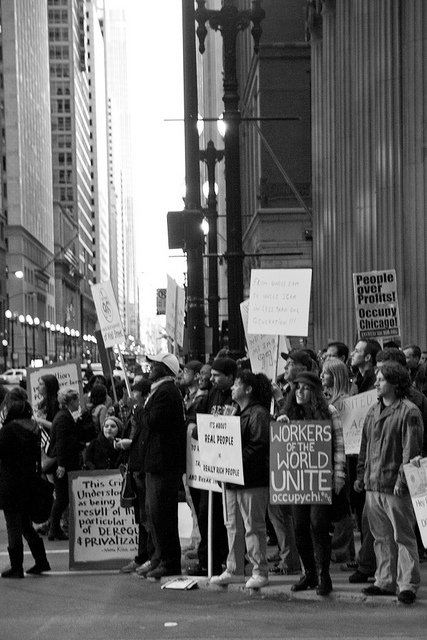By Shawn Fleek
A threatened closure of a window factory in Chicago has been delayed 90 days, after workers there occupied their factory for three days. The factory may still close, or a similar occupation may again take place, if the union or management can not find a new owner. The factory closure threatened 50 United Electrical and Radio Workers Local 1110 (UE) and non-union positions. The owners of the company, California-based Serious Energy, had planned to close the plant as part of a consolidation move.
After three days of increasingly-intense media scrutiny, the company shifted tactics, from ignoring the union and their obligations to it, to appeasing the union temporarily. Serious Energy said via press release that the media received “incomplete and incorrect” information about the immediate factory closure, claiming to be working to “find a new owner if possible and explore all other options.” This “if possible” leaves open the direct possibility that this factory closure is imminent in the minds of Serious management and continuing operations will directly impact the company’s bottom line during their restructuring.
The strike revisits a similar controversy from 2008, in which 200 UE workers staged a 6-day sit-in after management fired them without notice. The saga was documented in Michael Moore’s “Capitalism: A Love Story,” where it reached a national audience, attracting precious media attention to the management’s refusal to honor law (which states they must give a 60-day notice before a mass firing) as it pertains to the UE. Workers at the time received a $1.5 million dollar settlement from Bank of America, the major creditor in possession of the company, for lost wages and benefits. It was later revealed that the company’s CEO Richard Gillman had gutted the factory of its equipment, turned out the lights and moved on to the next factory for a similar cashing-out.
“What was interesting this time around is we had a huge camp of Occupy Chicago members outside of the factory,” UE organizer Leah Friedman told CBS News.
The mainstream media seems to have declared this emergency over, as headlines and articles pointed to a solution, with muddy details. Nothing to see here, move on, they declared:
Chicago Tribune: “Window factory sit-in ends with 90-day reprieve for workers”
CBS: “Workers At Window Factory Win Reprieve From Layoffs”
Huffington Post: “Goose Island Plant Occupation: Workers Occupy Chicago Factory In Desperate Move To Save Their Jobs”
WSJ: “Serious Energy and United Electrical Workers Union Come to Agreement”
In reality, this “reprieve” is a band-aid on a serious national problem. Employers are shedding union jobs like mad, and this factory is emblematic of the crisis in business. The workers there were re-hired with help from 2008 stimulus funds to make energy-efficient windows. Serious Energy claims that labor costs (the typical whipping post of corporations attempting to break unions) are only a part of the problem that the company faced. From the Chicago Tribune:
According to a statement from Serious Energy, “[ongoing] economic challenges in construction and building products, collapse in demand for window products, difficulty in obtaining favorable lease terms, high leasing and utility costs and taxes, and a range of other factors unrelated to labor costs, have compelled Serious to cease production at the Chicago facility.”
So perhaps even Serious Energy is not to blame for the firings (though a quick glance at the compensation packages of top-level Serious Energy management might do a lot toward finding the money to keep the plant open). The cause of the firing (according to Serious’ logic) is a collapsed housing market thanks to the fraud and extortion of the easy-money Federal Reserve and the zero-accountability “too big to fail” banks, a massive national bank robbery the Justice Department has barely attempted to prosecute. UE workers have contracts because their labor is the force that makes their company work. Without their labor there is no energy efficient window to sell, no matter the demand for the product. In tough economic times, some will argue against the unions’ right to collectively organize and demand better wages and benefits. Some will argue that companies should be able to pay workers as little as they wish, indeed should pay the lowest wage that any worker will accept. This attitude represents the moral failing of capitalism, to see the humanity behind the minimum wage (and health care costs) which is worth every penny of livable union wages and benefits packages. It is the logic of capitalism to divide workers against each other in competition, rather than see workers operating collectively.
America is becoming increasingly unequal thanks to slash-and-burn government spending policy (‘austerity”) and save-the-rich fiscal policy (“quantitative easing”). Unions like the UE are one of the few components of what we might call the “social safety net” which is not under government direction, though the government does regulate union labor practices, just as it regulates business practices. Programs like Social Security and Medicare are funded in the Federal budget. Unions are run by member contributions. This means that while fights to de-fund or de-fang Medicare and Social Security usually make the airwaves as a national conflict, fights to undercut unions are typically off-the-radar. We must draw attention to these fights when and where they take place, and particularly we must celebrate the presence of Occupiers outside the factory, supporting the plight of the UE workers, and all American workers tired of being punished for the wrongs of the rich, tired of having unequal protection under the law, and tired of being asked to work more and receive less. This strike has been temporarily successful, but continued pressure on businesses wishing to undercut union power is required to ensure a safe and equitable workplace in America.







